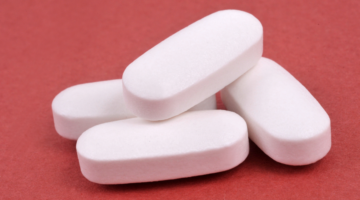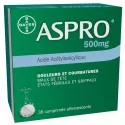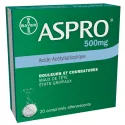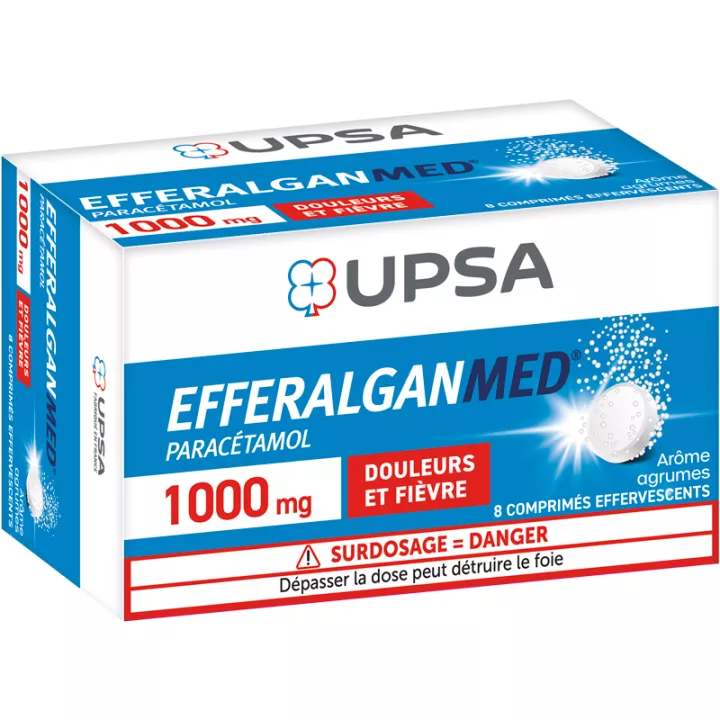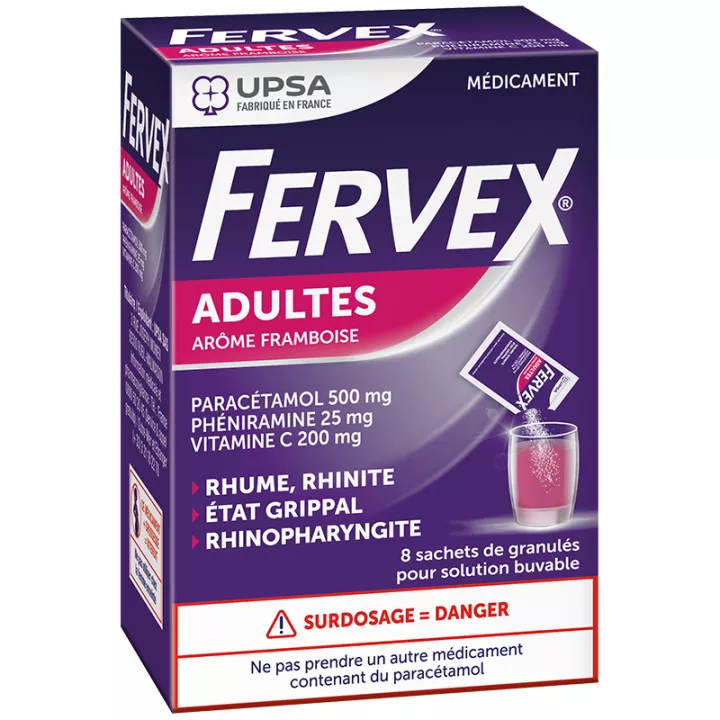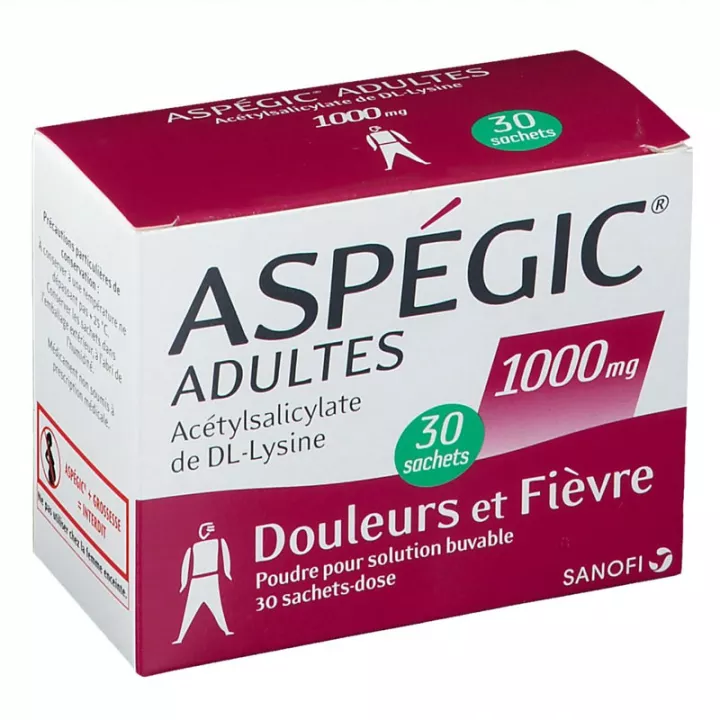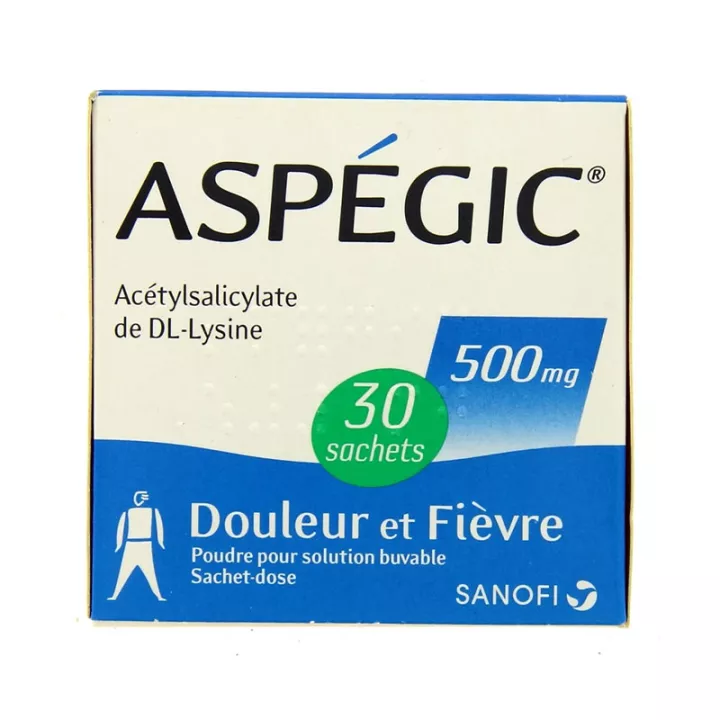NOTICE
ANSM - Updated on: 23/07/2014
Name of the medicinal product
ASPRO 500 EFFERVESCENT, effervescent tablet
Acetylsalicylic acid
framed
Read this leaflet carefully before you start taking this medicine. It contains important information for your treatment.
· This medication can be used in self-medication, ie used without consultation or prescription from a doctor.
· If symptoms persist, worsen or new symptoms appear, seek advice from your pharmacist or doctor.
· This leaflet is designed to help you use this medicine. Keep it, you might need to reread it.
DO NOT LEAVE THIS MEDICINE FOR CHILDREN
Review summary
In this notice :
1. WHAT IS ASPRO 500 EFFERVESCENT, effervescent tablet AND WHAT IT IS USED FOR?
2. BEFORE YOU TAKE ASPRO 500 EFFERVESCENT, effervescent tablet?
3. HOW TO TAKE ASPRO 500 EFFERVESCENT, effervescent tablet?
4. WHAT ARE POSSIBLE SIDE EFFECTS?
5. HOW TO STORE ASPRO 500 EFFERVESCENT, effervescent tablet?
6. ADDITIONAL INFORMATION
1. WHAT IS ASPRO 500 EFFERVESCENT, effervescent tablet AND WHAT IT IS USED FOR?
Pharmacotherapeutic group
This medication is an analgesic (it calms the pain) and an antipyretic (it lowers the fever).
Therapeutic indications
This medicine contains aspirin.
It is indicated for pain and / or fever such as headaches, flu-like conditions, dental pain, body aches.
This presentation is reserved for adults and children over 30 kg (approximately 9 to 15 years); read section 3. "Dosage" carefully .
For children weighing less than 30 kg, there are other aspirin presentations: ask your doctor or pharmacist for advice.
2. BEFORE YOU TAKE ASPRO 500 EFFERVESCENT, effervescent tablet?
List of information needed before taking the medication
If your doctor has told you about an intolerance to some sugars, contact your doctor before taking this medicine.
Cons-indications
You should never use ASPRO 500 EFFERVESCENT, an effervescent tablet for you or your child, in the following cases:
· allergy to aspirin or a related drug (including non-steroidal anti-inflammatory drugs) or to any of the other ingredients,
· history of asthma caused by the administration of aspirin or a related drug (including non-steroidal anti-inflammatory drugs),
· (24 weeks of amenorrhea) for doses above 100 mg per day (see section 4.6).
· ulcer of the stomach or duodenum in evolution,
· hemorrhagic disease or risk of bleeding,
· severe liver disease,
· severe kidney disease,
· serious heart disease,
· treatment with methotrexate used at doses greater than 20 mg / week and when aspirin is used at high doses as anti-inflammatory drugs (≥ 1 g per dose and / or ≥ 3 g per day), especially in the treatment of fever or pain (≥ 500 mg per dose and / or <3 g per day),
· treatment with oral anticoagulants, in the case of a history of peptic ulcer and when aspirin is used in high doses as anti-inflammatory drugs (≥ 1 g per dose and / or ≥ 3 g per day) fever or pain (≥ 500 mg per dose and / or <3 g daily).
(In case of doubt, it is essential to seek the advice of your doctor or pharmacist.
Precautions for use; special warnings
Take special care with ASPRO 500 EFFERVESCENT, effervescent tablet:
Special warnings
· If other medicines are combined, to avoid a risk of overdose, check the absence of aspirin in the composition of other medicines.
· In case of headaches occurring during prolonged use and high doses of aspirin, you should not increase the doses but take the advice of your doctor or pharmacist. The regular use of analgesics, in particular several analgesics in combination, can lead to kidney damage.
· Reye syndromes (a rare but very severe disease mainly associated with neurological disorders and liver damage) have been observed in children with viral diseases and receiving aspirin.
Consequently:
· in the event of a viral illness such as chickenpox or an episode of influenza: do not administer aspirin to a child without the advice of a doctor,
· in the event of a conscious or behavioral disorder and vomiting in a child taking aspirin, tell a doctor immediately.
Aspirin should only be used after advice from your doctor:
· in the case of G6PD (red blood cell inheritance) deficiency, as high doses of aspirin may cause hemolysis (destruction of red blood cells),
· in the case of a history of stomach or duodenal ulcer, digestive hemorrhage or gastritis,
· in case of kidney or liver disease,
· in asthma: the onset of an asthma attack in some subjects may be related to an allergy to nonsteroidal anti-inflammatory drugs or aspirin. In this case, this drug is contraindicated,
· in case of abundant rules,
· in case of treatment of a rheumatic disease,
· in case of treatment by:
o of oral anticoagulants, when aspirin is used at high doses in the treatment of fever or pain (≥ 500 mg per dose and / or ≤3 g daily) and in the absence of a history of gastrointestinal ulcer, duodenal,
o of oral anticoagulants, when aspirin is used in low doses as an antiplatelet agent (50 to 375 mg per day) and in case of a history of peptic ulcer disease,
o nonsteroidal anti-inflammatory drugs, when aspirin is used at high doses as anti-inflammatory drugs (≥ 1 g per dose and / or ≥ 3 g / day), especially in the treatment of fever or pain (≥ 500 mg taken and / or <3 g per day),
o glucocorticoids (except hydrocortisone as a substitute regimen), when aspirin is used at high doses as an anti-inflammatory drug (≥ 1 g per dose and / or ≥ 3 g per day)
o heparins used in curative doses and / or in patients over 65 years of age, when aspirin is used at high doses as an anti-inflammatory drug (≥ 1 g per dose and / or ≥ 3 g per day) treatment of fever or pain (≥ 500 mg per dose and / or <3 g daily
o the drugs used in the treatment of gout,
o clopidogrel,
o pemetrexed in subjects with low to moderate renal function,
o ticlopidine ( see section 3.d) Drug Interactions and Other Interactions ).
· During treatment: in the case of gastrointestinal haemorrhage (blood rejection through the mouth, presence of blood in the stool, stool coloration in black), STOP TREATMENT AND CONTACT IMMEDIATELY MEDICAL OR EMERGENCY MEDICAL SERVICE .
· This medicine is reserved for adults and children over 30 kg (about 9 years).
This medicine contains aspirin. You or your child should not take other medicines containing aspirin and / or non-steroidal anti-inflammatory drugs at the same time as this medication. Read carefully the leaflets for other medicines you or your child take to ensure that there are no aspirin and / or non-steroidal anti-inflammatory drugs. |
Precautions for use
Pain and fever :
For children under 30 kg (about 9 years), take a more appropriate dosage. Ask your doctor or pharmacist for advice.
· If pain persists for more than 5 days or fever for more than 3 days , or if there is insufficient efficacy or any other signs, do not continue treatment and see your doctor.
· Aspirin increases the risk of haemorrhage at very low doses even when the dose is several days old. PREVENT YOUR DOCTOR, THE SURGER, THE ANESTHESIST OR YOUR DENTIST, in case a surgical gesture, even minor, is envisaged.
· This medicine contains sodium. This medicine contains 250 mg sodium per tablet. To be taken into account in patients controlling their sodium dietary intake.
· This medicine contains sucrose. Its use is not recommended in patients with intolerance to sucrose (rare hereditary disease).
If in doubt, do not hesitate to seek the advice of your doctor or pharmacist.
Interaction with other medicines
Taking or using other medicines
When aspirin is used at high doses as anti-inflammatory drugs (≥ 1 g per dose and / or ≥ 3 g daily), particularly in the treatment of rheumatic conditions or in the treatment of fever or pain (≥ 500 mg per dose and / or <3 g per day), this medication should not be used in combination:
· with methotrexate used at doses greater than 20 mg / week,
· with oral anticoagulants and in case of a history of peptic ulcer,
This medication should be avoided in combination with:
· of oral anticoagulants, when aspirin is used at high doses in the treatment of fever or pain (≥ 500 mg per dose and / or ≤3 g daily) and in the absence of a history of gastrointestinal ulcer, duodenal
· of oral anticoagulants, when aspirin is used in low doses as an antiplatelet agent (50 to 375 mg per day) and in case of a history of peptic ulcer disease,
· nonsteroidal anti-inflammatory drugs, when aspirin is used at high doses as anti-inflammatory drugs (≥ 1 g per dose and / or ≥ 3 g / day), especially in the treatment of fever or pain (≥ 500 mg taken and / or <3 g per day),
· glucocorticoids (except hydrocortisone as a substitute regimen), when aspirin is used at high doses as an anti-inflammatory drug (≥ 1 g per dose and / or ≥ 3 g per day)
· heparins used in curative doses and / or in patients over 65 years of age, when aspirin is used at high doses as an anti-inflammatory drug (≥ 1 g per dose and / or ≥ 3 g per day) treatment of fever or pain (≥ 500 mg per dose and / or <3 g daily
· the drugs used in the treatment of gout,
· clopidogrel,
· pemetrexed in subjects with low to moderate renal function,
· ticlopidine ( see section 3.b "Warnings" ).
TO AVOID POSSIBLE INTERACTIONS BETWEEN SEVERAL MEDICINAL PRODUCTS, YOU MUST SIGNAL SYSTEMATICALLY ALL OTHER PROCESSING IN PROGRESS TO YOUR DOCTOR OR YOUR PHARMACIST).
Interactions with food and beverages
Not applicable.
Interactions with Herbal Medicines or Alternative Therapies
Not applicable.
Use during pregnancy and lactation
Do not take this medicine without consulting your doctor or pharmacist. |
Pregnancy
Low doses, less than 100 mg daily:
Low doses of acetylsalicylic acid of less than 100 mg per day may be prescribed in exceptional circumstances requiring specialized surveillance.
For doses above 100 mg per day
At these doses, and unless absolutely necessary, acetylsalicylic acid should not be prescribed during the first two trimesters of pregnancy. If acetylsalicylic acid is administered to a woman wishing to be pregnant or pregnant within six months, the dose should be as low as possible and the treatment period should be as short as possible.
At doses above 100 mg per day, acetylsalicylic acid is contraindicated beyond 5 months of pregnancy (24 weeks of amenorrhoea). You should NOT take this medication during the third trimester of pregnancy because its effects on your child can have serious consequences, especially on a cardiopulmonary and renal plan, even with a single dose.
If you are taking this medication while you are pregnant, talk to your obstetrician gynecologist for appropriate monitoring.
feeding
This drug passes into breast milk. As a precaution, it should be avoided during breastfeeding.
Ask your doctor or pharmacist for advice before taking any medicine
Sport
Not applicable.
Effects on ability to drive or use machines
Not applicable.
List of excipients with known effect
List of excipients with a known effect: sodium, sucrose.
3. HOW TO TAKE ASPRO 500 EFFERVESCENT, effervescent tablet?
Instructions for proper use
Not applicable.
Dosage, Mode and / or route (s) of administration, Frequency of administration and Duration of treatment
Dosage
This presentation is reserved for adults and children from 30 kg (approximately 9 to 15 years)
In case of pain, in case of fever
· For adults and children weighing more than 50 kg (from about 15 years old):
The maximum recommended daily dose is 3 g of aspirin, or 6 effervescent tablets per day.
The usual dosage is 1 500 mg effervescent tablet, to be renewed if necessary after 4 hours minimum. In case of pain or fever more intense, 2 tablets effervescent to 500 mg, to renew if necessary after 4 hours minimum, without exceeding 6 effervescent tablets per day.
· For the elderly:
The maximum recommended daily dose is 2 g aspirin, or 4 effervescent tablets per day.
The usual dosage is 1 500 mg effervescent tablet, to be renewed if necessary after 4 hours minimum. In case of pain or fever more intense, 2 tablets effervescent to 500 mg, to renew if necessary after 4 hours minimum, without exceeding 4 effervescent tablets per day.
· In children between 30 and 50 kg (approximately 9 to 15 years):
The dosage of aspirin depends on the weight of the child; the ages are mentioned for information purposes.
If you do not know the weight of the child, weigh it to give it the best dose.
Aspirin exists in many dosages, allowing the treatment to be adapted to the weight of each child.
The recommended daily dose of aspirin is approximately 60 mg / kg / day, divided into 4 or 6 doses, approximately 15 mg / kg every 6 hours or 10 mg / kg every 4 hours.
o For children weighing 30 to 40 kg (approximately 9 to 13 years), the dosage is 1 effervescent tablet per dose, to be renewed if necessary after 6 hours, without exceeding 4 effervescent tablets per day.
o For children weighing 41 to 50 kg (approximately 12 to 15 years), the dosage is 1 effervescent tablet per dose, to be renewed if necessary after 4 hours, without exceeding 6 effervescent tablets per day.
If in doubt, ask your doctor or pharmacist for advice.
Method and route of administration
Oral use.
Drink immediately after dissolving the effervescent tablet in a large glass of water.
Frequency of Administration
In case of pain, in case of fever: the systematic catches can avoid the oscillations of pain or fever.
In adults: catches should be spaced at least 4 hours apart.
In children over 30 kg (approximately 9 years), catches should be regularly spaced, including at night, preferably 6 hours and at least 4 hours (follow the recommended dosage).
Duration of treatment
The duration of use is limited: · at 5 days in case of pain, · at 3 days in case of fever. |
If the pain persists for more than 5 days or fever for more than 3 days or if it gets worse, do not continue treatment and consult your doctor ( see section "Precautions for use" ).
Symptoms and Instructions for Overdose
If you take more ASPRO 500 EFFERVESCENT, effervescent tablet than you should:
During the course of the treatment, it is possible that there may be ringing in the ears, a feeling of hearing loss, headache, dizziness, usually as an overdose of aspirin.
TREATMENT AND PREVENTION OF A DOCTOR MUST BE INTERRUPTED.
In case of accidental poisoning (especially frequent in young children), CONSULT IMMEDIATELY A DOCTOR.
Instructions for omission of one or more doses
If you forget to take ASPRO 500 EFFERVESCENT, effervescent tablet:
Do not take (or give your child) double dose to compensate for the single dose you have forgotten to take (or give to your child).
Risk of withdrawal syndrome
Not applicable.
4. WHAT ARE POSSIBLE SIDE EFFECTS?
Description of adverse reactions
Like all medicines, ASPRO 500 EFFERVESCENT, effervescent tablet is likely to have unwanted effects, although not everyone is subject to it.
· Immediately stop treatment and tell your doctor if:
o digestive haemorrhages ( see section 4.4 ). These are all the more frequent because the dosage used is high,
o allergic reactions such as rash, asthma attack, angioedema (facial urticaria with respiratory discomfort),
o headache, dizziness: these signs usually reflect an overdose of aspirin,
o Reye syndrome (development of consciousness or behavioral disorder and vomiting) in a child with a viral disease and receiving aspirin ( see section 4.4 ).
· Tell your doctor if you have abdominal pain, nosebleeds or gums.
Cases of stomach ulcers have been reported.
If you notice any side effects not listed in this leaflet, or if any of the side effects gets serious, contact your doctor or pharmacist.
5. HOW TO STORE ASPRO 500 EFFERVESCENT, effervescent tablet?
Keep out of the reach and sight of children.
Expiration date
Do not use ASPRO 500 EFFERVESCENT, effervescent tablet after the expiry date which is stated on the carton.
Storage conditions
No special storage conditions.
If necessary, warnings against visible signs of deterioration
Medicines should not be disposed of via wastewater or household waste. Ask your pharmacist what to do with unused medications. These measures will help protect the environment.
6. ADDITIONAL INFORMATION
Full list of active substances and excipients
What contains ASPRO 500 EFFERVESCENT, effervescent tablet?
The active substance is:
Acetylsalicylic acid ................................................ .................................................. 500 mg
For an effervescent tablet.
The other components are:
Mannitol, malic acid, polyvidone, sodium dioctylsulfosuccinate, citric acid, sodium bicarbonate, disodium carbonate, sodium saccharinate, lemon flavoring *
* Lemon flavor contains sucrose
Pharmaceutical form and content
What is ASPRO 500 EFFERVESCENT, effervescent tablet and contents of the pack?
This medication is in the form of an effervescent tablet. Box of 12, 20, 24 or 36.
Name and address of the marketing authorization holder and the holder of the manufacturing authorization responsible for the release of the lots, if different
Holder
BAYER HEALTHCARE SAS
220 AVENUE OF RESEARCH
59120 LOOS
exploiting
BAYER HEALTHCARE SAS
33 STREET OF INDUSTRY
74240 GAILLARD
Maker
DELPHARM GAILLARD
33, RUE DE L'INDUSTRIE
74240 GAILLARD
Names of the medicinal product in the Member States of the European Economic Area
Not applicable.
Date of approval of the notice
The last date on which this leaflet was approved is {date}.
AMM under exceptional circumstances
Not applicable.
Internet Information
Detailed information on this medicine is available on the Afssaps website (France).
Information for health professionals only
Not applicable.
Other
ADVICE / HEALTH EDUCATION
"WHAT TO DO IN THE EVENT OF FEVER":
A child is considered to have a fever when the temperature exceeds 38 ° C.
Fever is a natural and frequent reaction of the body to fight infections, it is very rare that it is the only sign of a serious illness or that it leads to complications.
What has to be done:
Generally it is only above 38.5 ° C that treatment is envisaged; however this should not be systematic, especially if the fever is well supported by the child.
1) Before giving a medication for fever, always:
· remove blankets and superfluous layers of clothing,
· present often to drink to the child,
· do not overheat the room (about 18-20 ° C).
These 3 simple measures are sufficient in many cases to lower the fever.
Other measures are available (warm baths, ice packs, moist wraps ...), they are not necessarily more effective and will only be considered if they do not increase the child's ill-being.
2) Secondly, the child may be given a fever medication (medication called antipyretic).
Read carefully section 3.c. "Precautions for use" in the package leaflet.
How should a fever medicine be used?
· respect the doses and delays between catches,
· give only one medication (do not combine or alter medications differently without medical advice),
· check that the child does not otherwise receive the same medication in another form (syrup, effervescent tablet, suppositories ...) or under another brand name.
If fever persists for several days, if new signs (especially stiffness of the neck, diarrhea, vomiting ...) or fever is badly supported (child slaughtered, losing its reactivity ...), you do not should not hesitate to consult a doctor.
"WHAT TO DO IF PAIN":
In the absence of improvement after 5 days of treatment,
If the pain returns regularly,
If they are accompanied by fever,
If they awaken your child at night,
CONSULT A DOCTOR.
